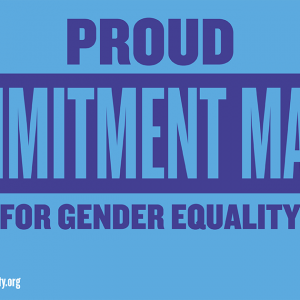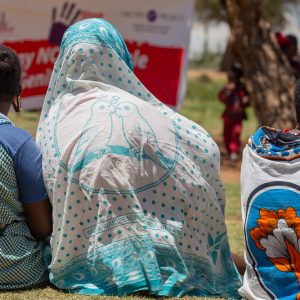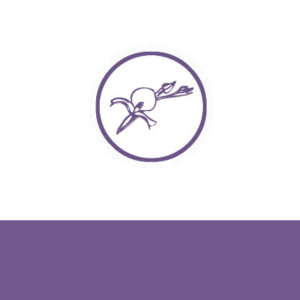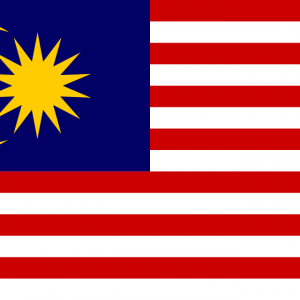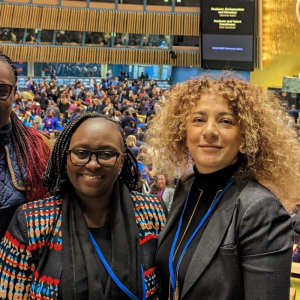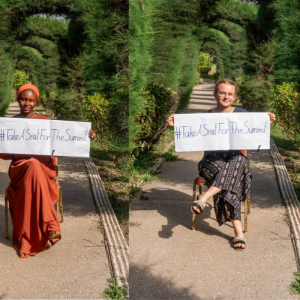The theme for this year’s 58th Session of the Commission on the Status of Women is ‘Challenges and achievements in the implementation of the Millennium Development Goals (MDGs) for women and girls’. Some of the Orchid Project team were in NYC last week, learning, advocating and networking.
While the review theme is the MDGs, a lot of talk at CSW is about the post-2015 sustainable development framework, and how to ensure that women and girls remain front and centre, and especially to make sure that violence against women and girls is not forgotten. Violence against women and girls was missing from the MDG framework, and the World Bank has found that more than 35% of women globally experience some form violence in their lifetime, so we cannot afford for violence to be missed out of the next development framework.
We also support the notion of a standalone Gender Equality goal for the post-2015 framework, and indeed a reduction in FGC prevalence could be a suitable indicator under a target to reduce violence against women and girls (VAWG). It also seems clear that gender needs to be mainstreamed throughout all of the other goals, and that the international community’s intentions for the next phase of sustainable development goals need to be transformational and aspirational, and we should remember that they are relevant to all of us – as Lynne Featherstone MP commented at an event at CSW last week, the UK also doesn’t have it right on violence against women, a sentiment echoed by her Australian counterpart, who reminded the audience that one-third of Australian women have experienced violence.
First thing on Monday 10 March, the first day of CSW, I moderated the panel ‘From Higher Education to Women’s Leadership’ which was a huge success, with at least 100 people crowding into the serene surroundings of the Church Centre’s Chapel. The panel discussed the role the U.S. higher education system can play in shifting the female global leadership paradigm in post-conflict nations. Speakers included Barbara Bylenga, co-founder and executive director of Open A Door; Leo Motiuk, co-founder of Afghan Girls Financial Assistance Fund; and Daniela Kaisth, vice president for external affairs and initiatives at the Institute of International Education (IIE).
The speakers shared their experiences building female leadership through connecting women and girls in post-conflict countries with access to higher education opportunities. The stand-out star of the panel was Simin Wahdat, an Afghan woman who is an Open A Door scholar. Simin is now studying for a post-graduate degree in the US and working with Congresswoman Betty McCollum to raise awareness in Congress of issues around Afghan women’s rights. Simin’s accounts of her experiences in Afghanistan, and of what her tertiary education means to her, were truly inspiring.
At a panel last Tuesday exploring VAWG as the ‘missing’ MDG, Dr Mary Ellsberg, Director of the Global Women’s Institute (GWI) at George Washington University, had some good news, and some interesting findings. GWI has done a systematic review of reviews of interventions on VAWG. Starting with over 3,000 studies, they found just 186 that had rigorous experimental design, and that 70% of these came from six OECD countries. A tiny proportion of these evaluated interventions came from Africa and Asia. However, of those in low and middle income countries, 88% focused on primary prevention of VAWG, and more than half of those looked at harmful traditional practices. Interestingly for those of us working in this area, the GWI study also concluded that most interventions seeking to shift harmful traditional practices were effective in some way. It’s heartening to hear this, but the GWI study also raises an issue we are oh so aware of – experimental design to evaluate interventions is rare.
Which meant that the presentation which followed later, outlining results from a randomised control trial of Raising Voices/Sasa, were even more exciting to hear. An RCT evaluation of Raising Voices looked, over a three year period, at attitudes towards VAWG in communities where the programme happened, versus where it didn’t. What it’s found is that the acceptability of VAWG decreased, acceptance of physical violence in relationships decreased, men were more aware that they could be the first to stop violence, and that levels of intimate partner violence were 52% lower in communities with the programme than in the control. This is quite astonishing, and shows the real potential there is to prevent violence in communities by investing in social norm change, through an intense programme with plenty of resource.
I also met with women from the Sudanese Women’s General Union, who were presenting their work, and it was incredible to hear about what they are doing, in the face of great resource and other problems in their country. The inestimable Claudia Cappa from the Data & Analytics unit of Unicef also talked in depth about Unicef’s data on FGC, and her findings which are contained in the study released in July 2013. Claudia explained that we now have 74 surveys on FGC, since the inclusion of the first FGC module in Sudan’s Demographic and Health Survey in 1989-90.
Claudia’s presentation really brought home to me the fact that the new data is showing us change over a long period of time, four decades, as some of the women in the oldest cohort experienced FGC as long ago as the 1960s. Given this, it actually means that the current data are not showing us change due to recent interventions which have mainly taken place in the past 20 years (except for perhaps Kenya). The data show that social acceptance is the most frequently stated ‘benefit of cutting’, although it also showed starkly that ‘no benefit’ ranks very highly – and yet people continue to do it.
This is just a snapshot of Orchid Project’s learnings from the first week of CSW – CSW continues until 21 March and we will look forward to seeing the agreed conclusions from this week’s discussions. It’s always an energising experience to be in the same place as so many people from around the world who are really focusing their energies on making this world a better place for women, and hence everyone.

